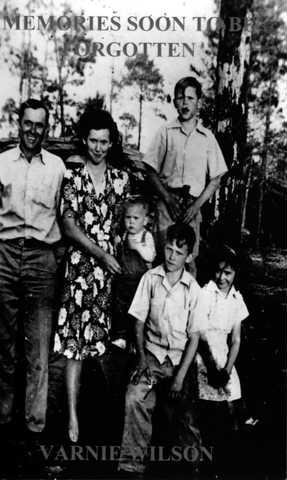Local businessman and insurance salesman Varnie Wilson decided to write a book so that he could tell the story of how he lived as a child to all his children. On his 80th Birthday his family had it bound and printed as a paperback book in a limited private edition and gave copies to him. He was kind enough to share a copy with Historic Effingham Society and from this I will share some excerpts directly from the book.
Varnie was the second child born to Rudolph and Dreta Wilson. He had an older brother Charles, a sister Rachael and his youngest sibling was a brother Wendel. Born in August of 1935, Varnie describes the house where they were reared. It had oil lamps for lighting and an Alladin lamp that seldom worked. Heat consisted of a fireplace in the bedroom of the four room house and a woodstove in the kitchen. The woodstove was used summer and winter for cooking. The house was not tight, without insulation, and a pane of glass was missing from a bedroom window. To keep warm they slept under piles of quilts so heavy that you could hardly turn over. To this day, Varnie does not like cats because one would come in the missing window pane and get in the bed and purr.
Running water had to be drawn from a well 75 feet from the house or from a pitcher pump on the porch, if it was not freezing weather. The toilet was located out in the chicken yard. It was a three-hole outhouse. He recalled a chicken would peck you on the bottom, so you had to watch out for chickens. Toilet paper was a Sears catalog or a corn cob.
The ice box was a hole dug in the smokehouse floor lined with sawdust. An ice man came by and sold ice or they bought it in town and wrapped it in a croaker sack, bringing it home and putting it in the makeshift ice box. It kept things that would spoil cool.
They raised chickens and sold eggs to buy things at the store. A cow was milked daily to provide milk and cream. Butter was made from the cream and excess butter could be traded at the store for items needed. The chickens ate corn and laying mash. His mother would go pick the patterns on the feed sacks at the feed store to make dresses and skirts for Rachael and herself.
They always ate collards cooked in a big pot with fat meat. If you did not like this, you were out of luck. There was no turning up your nose at what was on the table. When a lot of chickens were butchered to sell, his mother would cook the chicken heads and chicken feet. He said they tasted so good probably because of what they usually ate.
Adventures in farming as youngsters kept him and Charles home from school for a while when their father had to have surgery. They were not strong enough to handle bags of fertilizer but rigged a board to slide it off the wagon. Somehow they managed to get the crop planted.
One time when their parents were on a trip, 12 to 15 cows got sick so they got the veterinarian out of Sylvania to come. He inspected the cows and said they were poisoned by a fern they had eaten. The treatment was a quart of black coffee twice a day. Racheal made the coffee. They would not drink it so she got a bottle to pour it down their throats. By the time they finished it was time to start again with the cows giving them coffee.
Varnie vividly describes riding in the back of the pickup with quilts for warmth in winter and a service station on this side of the viaduct in Savannah, where the more gas you bought, the more dishes the customers received.
A game they enjoyed was Can on the Mountain described in the book.
As the book winds down Rudolph and Dreta bought the old Freyermuth place on an auction and they moved from where they lived on Angus Exley Road, which was not eligible for electricity. This new “old house” had electricity and was on the Old Dixie Highway.
A copy of the book has been donated to the Historic Effingham Society. You may visit and read it during regular operating hours, which are Mondays 9 a.m.,noon and Tuesdays through Fridays 9 a.m.-1 p.m. Tour the gift shop for items for your Christmas gifts including the 2016 HES Calendar and the new collectible Barlow ornament – New Hope AME Church on Brogdon Road in Guyton which is on the National Register of Historic Places.
This was compiled by Susan Exley of Historic Effingham Society from Varnie Wilson’s “Memories soon to be Forgotten.” If you have photos, comments or information to share, contact her at 754-6681 or email her at: hesheraldexley@aol.com








